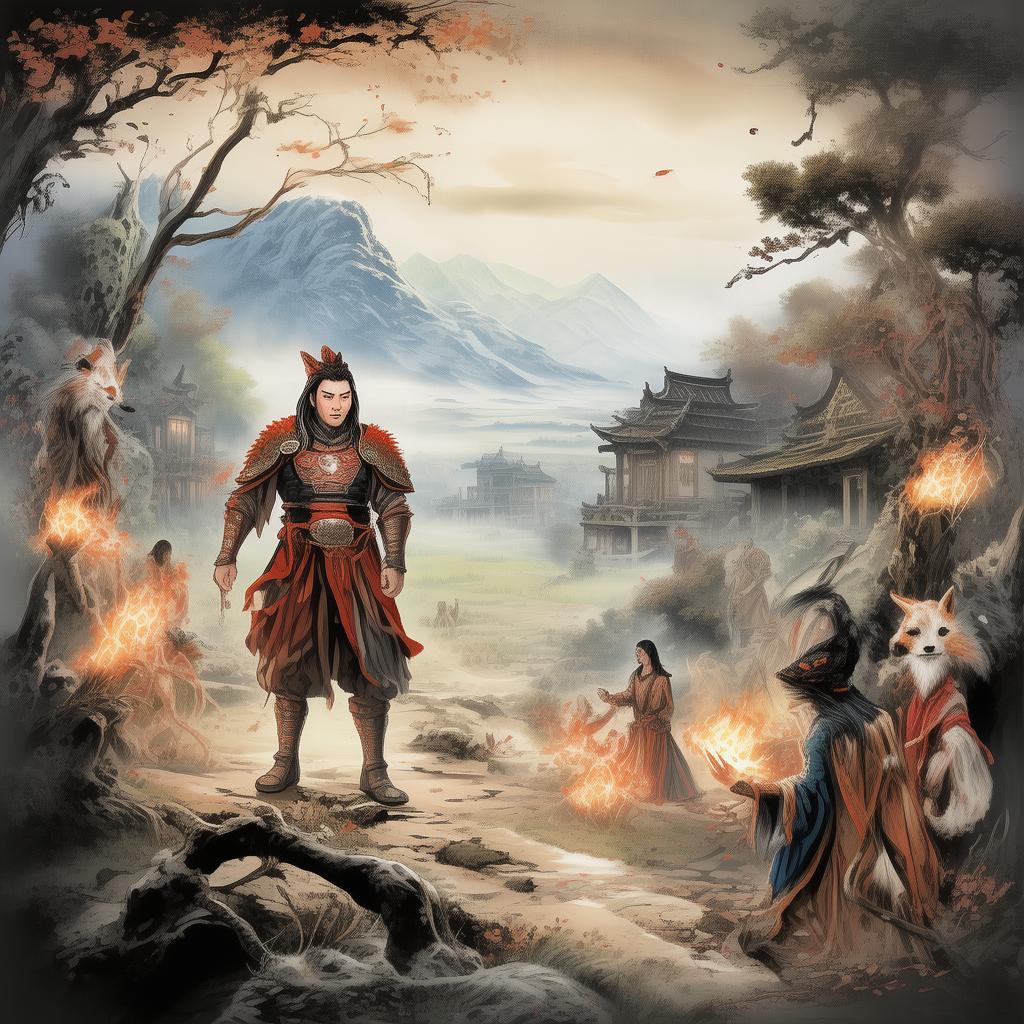The Dragon's Roar: A Peking Opera Comedy
In the bustling heart of ancient China, there was a Peking Opera troupe that had been performing for generations. Known for their intricate costumes, exaggerated expressions, and thunderous roars, they were the talk of the town. But little did they know that their next performance would turn their lives upside down, merging the world of the stage with the folklore of the dragon.
The troupe's lead actor, Master Li, was a man with a passion for the art of Peking Opera. His roars were so thunderous that they were said to rouse the dragons from their slumber. It was Master Li's belief that the dragon's roar was not just a sound, but a powerful force that could bring prosperity and good fortune to those who understood its magic.
The story begins with the troupe preparing for their grandest performance yet. They had been invited to perform at the imperial court, a dream come true for any Peking Opera actor. However, as the troupe gathered for their final rehearsal, they received a mysterious letter. It was a challenge from a rival troupe to outperform them and prove that their art was superior.
Disheartened but undeterred, the troupe decided to take on the challenge. They decided to incorporate a comedic twist into their performance, hoping to outshine their rivals. They chose to feature a comedic version of the dragon's roar, a spectacle that had never been seen before.
As the night of the performance approached, the troupe worked tirelessly to perfect their act. Master Li, who was to play the dragon, spent days practicing his roar, but something was amiss. The roar he had been perfecting all these years seemed to lack the power he once knew. He grew worried, feeling that the spirit of the dragon was slipping away from him.
On the night of the performance, the court was abuzz with anticipation. The troupe took to the stage, and the performance began with the traditional opening of a Peking Opera, filled with the usual roars and dramatics. As the story unfolded, the troupe introduced their comedic twist: a dragon that was not just fierce but also incredibly clumsy and humorous.
Master Li, as the dragon, was supposed to roar with such force that it would shake the very foundations of the court. Instead, when the moment came, the roar was weak, almost laughable. The audience was taken aback, and the court officials, who had expected the usual spectacle, began to murmur among themselves.
As Master Li's roar faded, a strange silence fell over the court. It was then that a figure emerged from the shadows, a man dressed in ancient attire, his eyes gleaming with mischief. He approached the stage and addressed the crowd, "Ladies and gentlemen, the true roar of the dragon has been forgotten. It is not a sound, but a spirit that requires the heart and soul of the performer."
The man turned to Master Li and placed a hand on his shoulder. "Master Li, your roar was once the stuff of legends, but now it is time to rediscover the spirit of the dragon within you."
The man then led Master Li to a sacred alter, where he performed a ritual, invoking the spirit of the dragon. The air around them crackled with energy as the spirit was called forth. Master Li took a deep breath and let out a roar that shook the entire court. The roar was not just powerful; it was filled with emotion and spirit.

The audience erupted in applause, and the court officials were awestruck. The rival troupe, who had been expecting a traditional performance, were left speechless. The comedic twist had been overshadowed by the true roar of the dragon, and the performance was a resounding success.
In the aftermath, Master Li realized that the roar was not just a sound, but a representation of the spirit of the dragon. It was a reminder that the power of Peking Opera lay not just in the artistry, but in the heart and soul of the performers.
The Dragon's Roar: A Peking Opera Comedy became a tale that was told and retold, a story of how a comedic twist could lead to a profound revelation. It was a story that reminded people of the magic that could be found in the art of Peking Opera and the power of the spirit within each performer.
✨ Original Statement ✨
All articles published on this website (including but not limited to text, images, videos, and other content) are original or authorized for reposting and are protected by relevant laws. Without the explicit written permission of this website, no individual or organization may copy, modify, repost, or use the content for commercial purposes.
If you need to quote or cooperate, please contact this site for authorization. We reserve the right to pursue legal responsibility for any unauthorized use.
Hereby declared.









